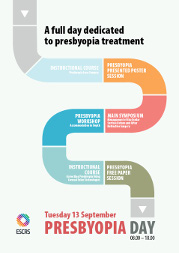Posters
Preliminary results of CO2 laser-assisted sclerectomy surgery (CLASS) in the treatment of moderate to advanced glaucoma in a Chinese population
Poster Details
First Author: D. Yick HONG KONG
Co Author(s): J. Lee S. Tsang C. Yuen
Abstract Details
Purpose:
Deep sclerectomy surgery is a non-penetrating filtering procedure which is proposed as a procedure similar to trabeculectomy, but the manual procedure is technically very demanding. CO2 laser-assisted sclerectomy surgery (CLASS) is an enhanced adaptation of manual deep sclerectomy by using a CO2 laser (IOPtiMate; IOPtima, Tel Aviv, Israel) to remove the sclera tissue leaving a thinned membrane just enough for aqueous seepage, but without entering the anterior chamber as the laser energy is absorbed in the presence of fluid. The aim of this study was to investigate the efficacy and safety of CLASS in Chinese glaucoma patients.
Setting:
Caritas Medical Centre, Hong Kong
Methods:
Glaucoma patients from Caritas Medical Centre, Hong Kong who had moderate to advanced disease with suboptimal IOP control despite maximally tolerated anti-glaucoma eye drops were offered CLASS surgery for IOP lowering. Outcome measures include: changes in IOP and medication use before and after the procedure as well as the safety profile including any intra-operative or post-operative complications.
Results:
25 eyes of 22 glaucoma patients with a mean age of 66.7±12.8 years were recruited. The mean retinal nerve fiber layer thickness was 60.8±16.9 µm with an IOP of 24.8±2.68 mmHg while on 3.56±1.08 types of anti-glaucoma eye drops pre-operatively. One patient had iris prolapse during the use of CO2 laser intra-operatively. There were no post-operative complications including wound leak, hypotony, shallow anterior chamber, hyphema, nor infection. IOP was significantly (P<0.05) reduced by 16.0% (3.96±7.35 mmHg) and 14.8% (3.67±7.93 mmHg) at 1 and 3 months, respectively post-operatively and medications were reduced by 59.0% (1.46±1.61 medication types) at 3 months (P<0.001).
Conclusions:
CLASS effectively reduced IOP and medication use in the early post-operative period. It has a high safety profile as surgical treatment of moderate to advanced glaucoma. Longer follow-up is warranted to assess its sustainability.
Financial Disclosure:
NONE





